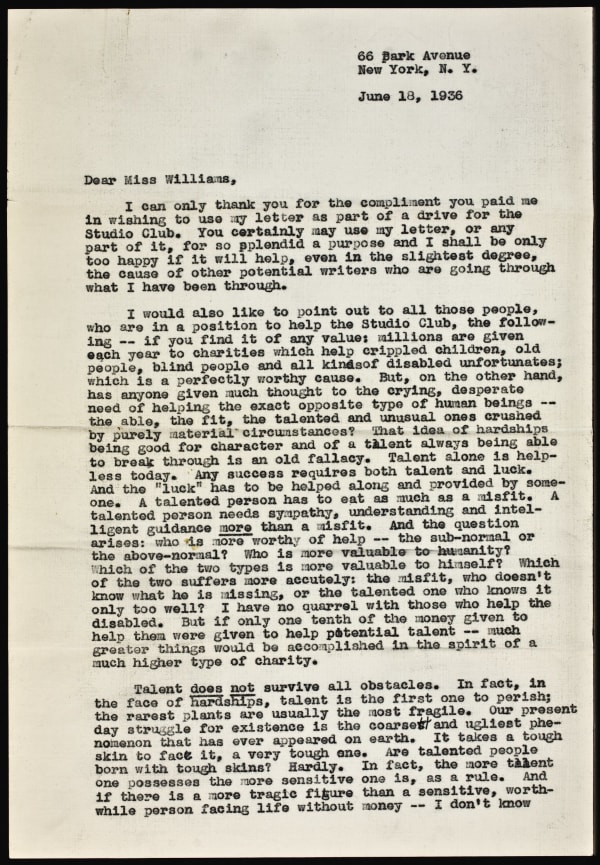
Approximately half of this letter was later used as a fundraising appeal for the Studio Club, and a shorter selection was reproduced in the one-page history of the Club in the late 1990s in the display case of the building at 1215 N. Lodi Place, Hollywood.
[Page 1]
66 Park Avenue
New York, N. Y.
June 18, 1936
Dear Miss Williams,
I can only thank you for the compliment you paid me in wishing to use my letter as part of a drive for the Studio Club. You certainly may use my letter, or any part of it, for so splendid a purpose and I shall be only too happy if it will help, even in the slightest degree, the cause of other potential writers who are going through what I have been through.
I would also like to point out to all those people, who are in a position to help the Studio Club, the following—if you find it of any value: millions are given each year to charities which help crippled children, old people, blind people and all kinds of disabled unfortunates; which is a perfectly worthy cause. But, on the other hand, has anyone given much thought to the crying, desperate need of helping the exact opposite type of human beings—the able, the fit, the talented and unusual ones crushed by purely material circumstances? That idea of hardships being good for character and of a talent always being able to break through is an old fallacy. Talent alone is helpless today. Any success requires both talent and luck. And the “luck” has to be helped along and provided by someone. A talented person has to eat as much as a misfit. A talented person needs sympathy, understanding and intelligent guidance more than a misfit. And the question arises: who is more worthy of help—the sub-normal or the above-normal? Who is more valuable to humanity? Which of the two types is more valuable to himself? Which of the two suffers more accutely: the misfit, who doesn’t know what he is missing, or the talented one who knows it only too well? I have no quarrel with those who help the disabled. But if only one tenth of the money given to help them were given to help potential talent—much greater things would be accomplished in the spirit of a much higher type of charity.
Talent does not survive all obstacles. In fact, in the face of hardships, talent is the first one to perish; the rarest plants are usually the most fragile. Our present day struggle for existence is the coarsest and ugliest phenomenon that has ever appeared on earth. It takes a tough skin to face it, a very tough one. Are talented people born with tough skins? Hardly. In fact, the more talent one possesses the more sensitive one is, as a rule. And if there is a more tragic figure than a sensitive, worthwhile person facing life without money—I don’t know
[Page 2]
(2)
where it can be found.
The Studio Club is the only organization I know of personally that carries on, quietly and modestly, this great work which is needed so badly: help for young talent. It not only provides human, decent living conditions which a poor beginner could not afford anywhere else, but it provides that other great necessity of life: understanding. It makes a beginner feel that he is not, after all, an intruder with all the world laughing at him and rejecting him at every step, but that there are people who consider it worth while to dedicate their work to helping and encouraging him. Isn’t such an organization worthy of everyone’s support? What if out of every hundred whom the Studio Club helps, ten will prove that they had something worth saving, something which might have perished without help at the most dangerous time of the first steps? Isn’t it worth the gamble? So many gamble on roulettes, and slot-machines, and horses. Why not gamble for a change on human beings and human futures?
I have gone into all this at such length because it is a question for which I have felt a kind of crusading spirit for a long time. I have always hoped to be able to express these things some day and to be heard. If it can be of any assistance to the Studio Club, you may quote it all or any part of it you find valuable. And you know that my best wishes and gratitude are with the Club always.
I would like to be entered as a contributing member of the Club and I am enclosing a check for it. When I become more firmly established, I hope to be able to contribute a more substantial membership.
In closing, I want to thank you for your kind opinion of my novel. I am very happy to know that you liked it. And I was delighted to read your opinion on individualism. That one word—individualism—is to be the theme-song, the goal, the only aim of all my writing. If I have any real mission in life—this is it. And you know how badly it is needed at present!
With best personal wishes,
Sincerely yours,